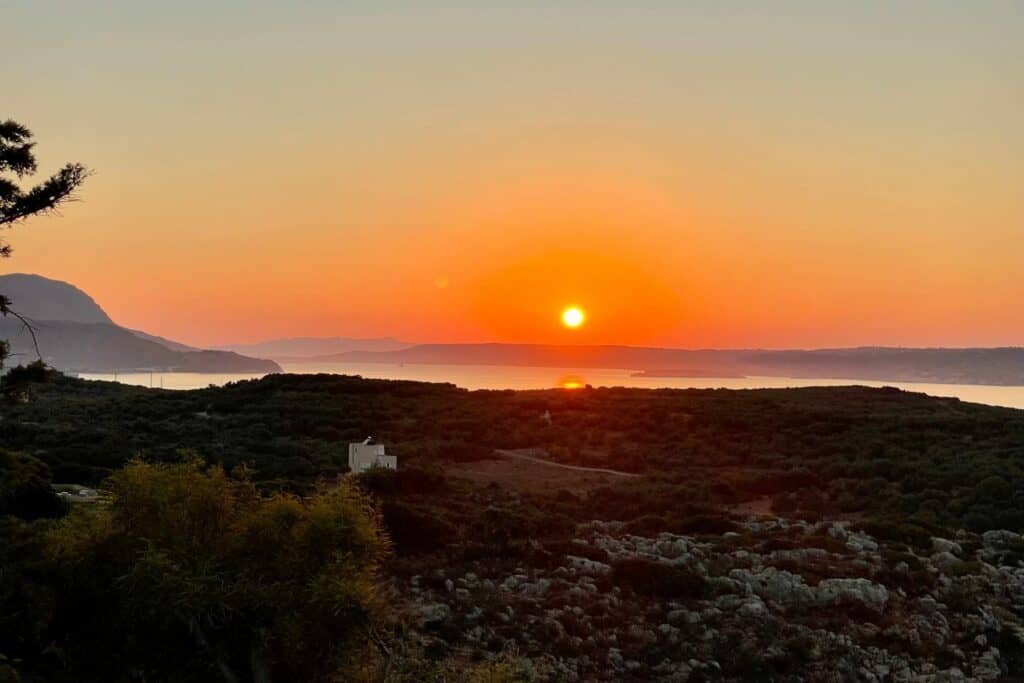
The Greek island of Crete is known for its rich history and culture, spectacular landscapes, and incredible cuisine. Laz Hernandez, an Army retiree, and his wife, Theresa, fell in love with Crete while on a cruise in 2012. Six years later, with three large dogs in tow, Laz and Theresa took a one-way flight to that island paradise and have lived there ever since!
In this personal Q&A with Theresa, part of our Veterans Living Overseas Interview Series, learn why they think the pros of Crete far outweigh any cons, and find out what daily life is like on the gorgeous Mediterranean island!
Why did you decide to live overseas after military retirement, and how did you choose Greece?
We had been stationed overseas for the majority of my husband’s career, and just couldn’t settle back in the US. We missed the culture and history of Europe, and the safety aspect was important too.
When we first married, we lived in Turkey and had always wanted to retire there, but the political situation changed substantially, so that plan was ruled out.
We visited Crete on a cruise back in 2012 and fell in love with the island. We were impressed with the scenery, the food, the culture, and it had the relaxed vibe we were looking for.
Why did you choose your city?
When we first moved to Crete we arranged a couple of lengthy Airbnb stays. We were in the Heraklion area for the first three months, and then down on the southeast coast, close to Ierapetra, for another month.
We eliminated Heraklion as an option, as it was too built up for us, and the south coast as being too remote.
We found a rental house through Facebook in the Apokoronas region of Chania. As soon as we drove through the gate, we knew we wanted to live there! We chatted to the landlord about the area and discovered that there was a large expat community (mostly Brits), and we were less than an hour from the airport and NSA Souda Bay.
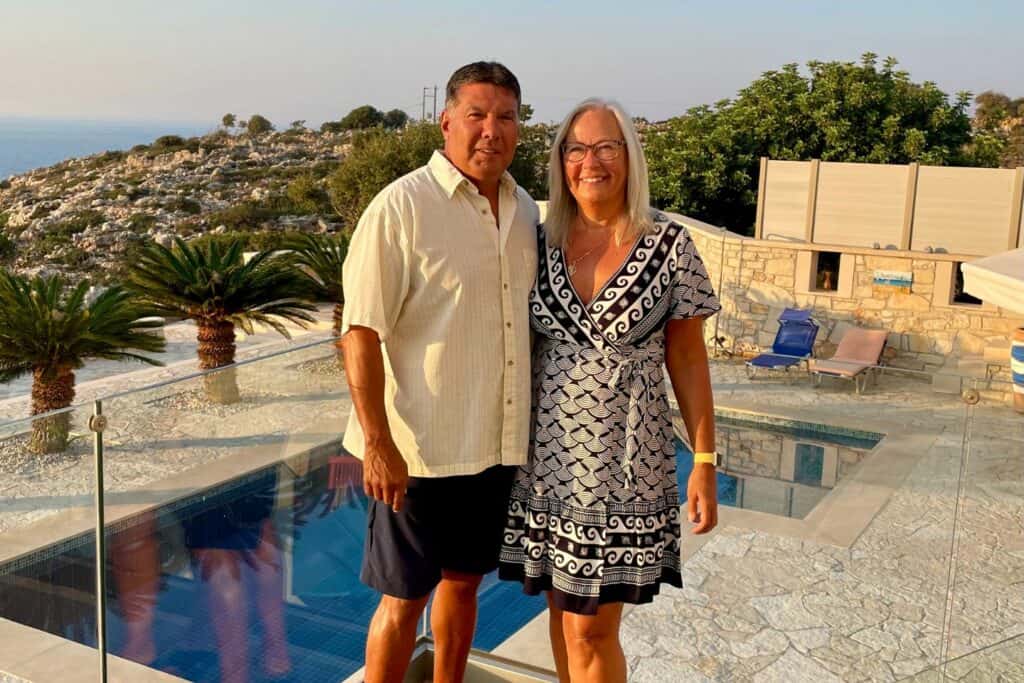
To be honest, we weren’t totally convinced that this would be our permanent location at that point, but we’re still here, so it definitely worked out!
What type of residence visa do you have?
I have dual UK/US citizenship, and I got residency through my then-EU passport. My husband got his residency as my spouse.
| Related Reading: Visa Options for Veterans Moving Overseas
We now have biometric cards under the EU-UK Withdrawal Agreement. These give us full market access within Greece but aren’t transferable to any other EU country.
What facilities can you use at NSA Souda Bay?
We were surprised to find out that we could access the base (you must have residency to do so and submit mounds of paperwork each year).
We have an FPO box (1 lb send/receive limit, per the regulation), commissary and NEX privileges, space-available health care, pharmacy access, and fuel benefits (gasoline, no diesel).
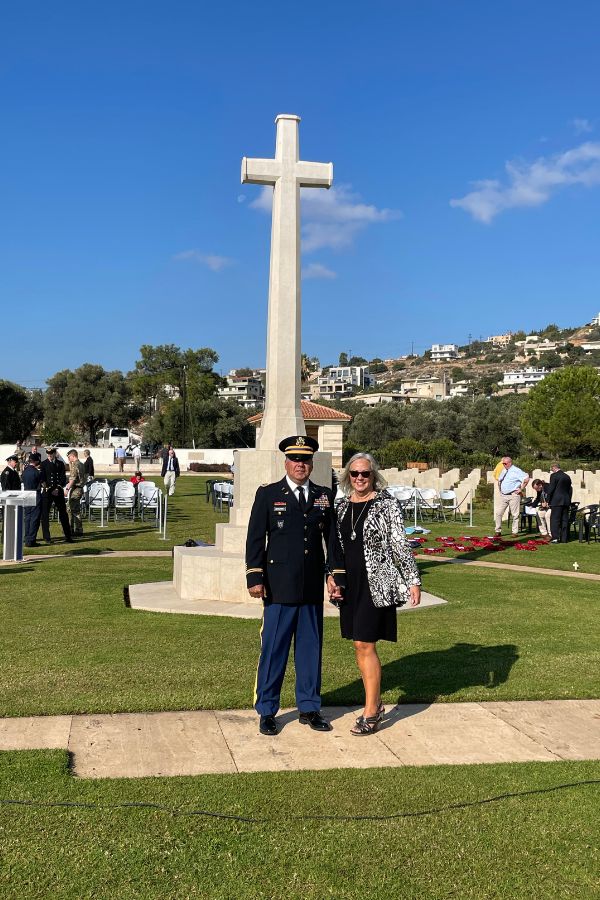
The base transportation office even handled all the arrangements for our household goods (HHG) delivery and helped with customs. Great customer service in all facilities on base! There’s also an active retiree association.
Did you need to pay extra to move your HHG to Greece?
My husband still had his final military move that he had extended several times. We paid out of pocket to store our HHG in the States and kept the final move for Greece.
We didn’t pay anything extra to move everything to Crete, which was a pleasant surprise. However, we did pay some customs import fees (about €3000) once they were delivered to the port in Souda.
Note from Poppin’ Smoke: this article explains the Joint Travel Regulations (JTR) guidance on HHG storage and the final move for retirees.
What was the process for moving to Greece with dogs?
We flew the dogs as excess baggage on our flights. To do this, we had to fly with a non-US carrier; we chose Air France from Atlanta. We had a connection in Paris, and another in Athens. It was a long day for all of us!
The dogs needed a health certificate dated within 10 days of departure, a copy of their rabies certificate (signed in blue ink), and a United States Department of Agriculture (USDA) stamp. We used a vet on base, where all the vets are USDA certified, so we didn’t need to send the health certificates to the USDA for the stamp.
The cost was $200 per dog to Athens, and €80 per dog to Heraklion. Two dogs weighed more then 60lbs, and one was 50lbs.
We had to collect the dogs at each connection, which allowed us to walk and potty them before the next leg. They weren’t happy about going back in their crates, but they seemed to forget the entire ordeal within 10 minutes of arriving at our rental house in Heraklion!
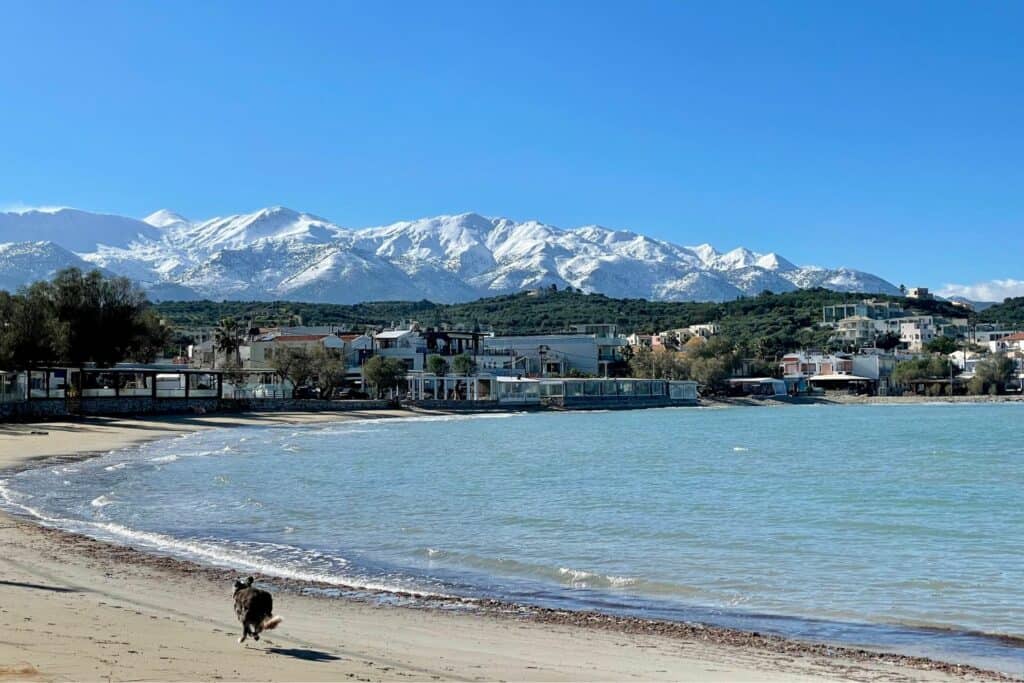
Do you speak Greek? If not, is it difficult to navigate daily life?
I have tried to learn Greek, but it is a really difficult language! I have a few stock phrases (mostly for use in restaurants), but as pretty much everyone here speaks English, it’s easy to get by without knowing Greek.
The exception is when you travel into the middle of the island, away from the tourist areas. Sign language and charades usually get us understood, though!
How does the cost of living in Greece compare to the US?
The cost of living is definitely less than in the US, although prices have risen considerably since we moved here. For context, the minimum wage in Greece is around €750/month.
A 2-bedroom furnished apartment will start at around €600/month, and a 3 – 4 bedroom villa with a pool will start around €1000/month. Add a sea view and the price can increase to €2000/month.
Fruits and vegetables are fresh and tasty, and they are mostly grown on the island. The prices are good and the quality is excellent, but it can be difficult to find products not sourced locally, and of course you will pay a premium.
Milk is around €1.80/liter. Eggs are €5/dozen for free range. I can buy a kilo of fresh Greek yogurt for less than €4!
House wine at a taverna will run €4-5 for a half liter carafe, and a large beer around €3.50-4.50. Eating out ranges from a cheap gyros lunch of less than €15 for two with soft drinks, to a decent traditional taverna dinner with wine for around €40/couple.
Of course there are high-end restaurants, too; our highest priced local restaurant is Michelin star quality and runs around €100-120 per couple with a bottle of wine.
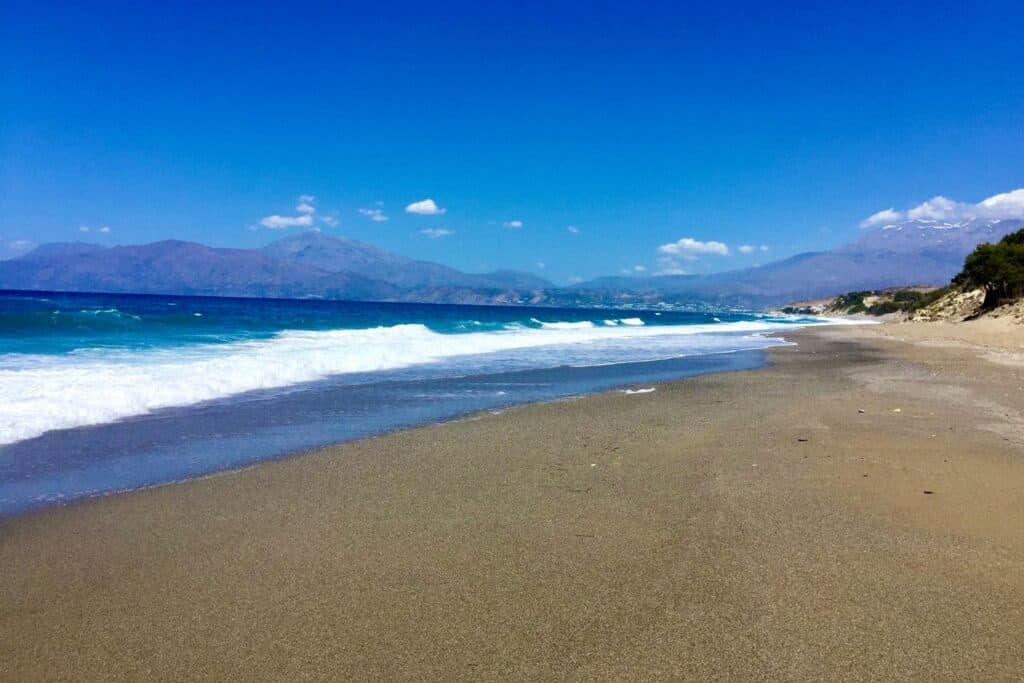
The other thing that has been considerably less expensive here has been the cost of veterinary care. We brought our three dogs with us from the States, and their care here has been a fraction of what it was.
For example, an annual health exam and vaccinations for a dog costs €25 here, whereas I was paying well over $100 for the same service in America. Blood work is about a third of the cost, and X-rays are €25 for a set. Monthly medications are less expensive also.
Our water bill runs about €25/month. Electricity costs have increased a lot since we arrived. If we were running air conditioning etc., the bills could reach over €500/month.
Last year we installed a PV solar system, which actually produces way more power than we use, so it was a fantastic investment, plus the added bonus of having power during the not infrequent power cuts.
Our cell phone bill for two phones with unlimited data (no additional charge for use throughout Europe and the UK) is around €75/month. We have Starlink for internet, as the local provider uses poor quality DSL lines, and that costs €40/month.
Any tips for buying a house in Greece?
I was a realtor in the US for many years, and the purchase of our home in Crete was the most frustrating transaction of my life!
Things definitely work differently here, and no one really communicates what needs to be done, nor does anything in a timely manner. The bureaucracy is a nightmare, and planning laws make absolutely no sense. Our cash purchase took 18 months to close!
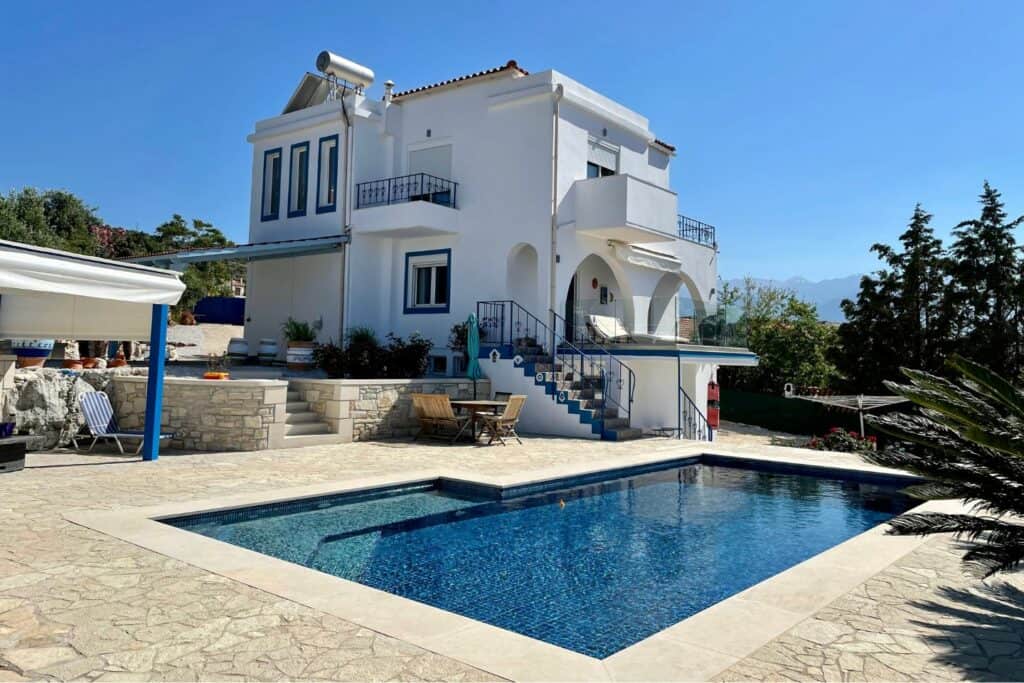
The most important person in the transaction (in my opinion) was the civil engineer. He was responsible for making sure the house was built according to the original building permit, and any discrepancies had to be “legalized” by paying a fine. These discrepancies were sometimes as simple as a window that was a few centimeters different from the plans.
We had our own lawyer, who ran the title search. The closing was done by a notary (who is also an attorney, unlike a notary in the US).
Also, it’s almost impossible to obtain a mortgage as a foreigner. Despite all the headaches, we are very grateful to have been able to purchase our home, especially as prices have risen so much since we bought it in 2021.
Side note: we did a show for HGTV when we first arrived in Crete and were initially renting; we bought the same house three years later. Check out Season One of the series “Mediterranean Life” (only available in the US).
How is the local medical care? What insurance do you use?
We have Tricare Select Overseas but have yet to make a claim.
Health care is very good here, and incredibly affordable. A typical doctor visit is similar to our copay in the US (around €25-30) and they won’t charge for follow-up visits.
A specialist visit is typically €50. My husband had an MRI for a herniated disc in his neck a couple years ago; the MRI, radiologist, and two visits with a neurosurgeon cost €150.
We can get limited space-a care at the health clinic on base.
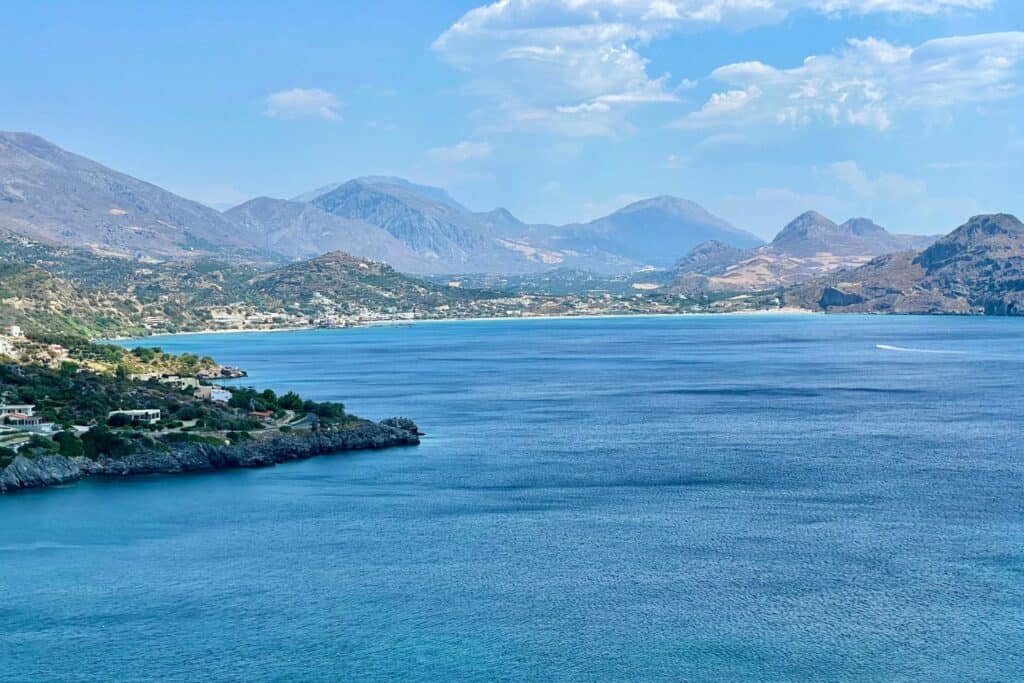
Does Greece tax your military retirement or other US income?
We are classified as non-tax residents because our sole income is from a military pension and disability, which means we pay our taxes in the US.
We must file a zero tax return each year in Greece. If we had Greek income of any kind, we would be taxed on our global income. As taxes are very high here (45-75%), we will never work in Greece!
(Think you’ve found your next home overseas? Answer these 24 questions before you make the move.)
Is there anything you wish you had known or done differently prior to moving to Greece?
I wish I had known how easy it was to get residency as an EU citizen (pre-Brexit). We actually hired an attorney to help us with that when we first arrived, but in hindsight it was completely unnecessary.
Also, we found out after the fact that it would have been possible to get a customs tax exemption from the Greek Embassy prior to shipping our HHGs that would have avoided the payment required at the port once everything reached Crete.
Tell us about life in Greece!
We live in a fairly rural community, about 40 minutes from the main city of Chania. It’s a very laid back lifestyle.
We spend a lot of time at home in the summer, enjoying the pool and the glorious weather. Of course, there are regular trips to the many local beaches.
We have a good social life, spending many evenings out with friends at dinners or local music gigs. Having a large expat community definitely makes this easier.
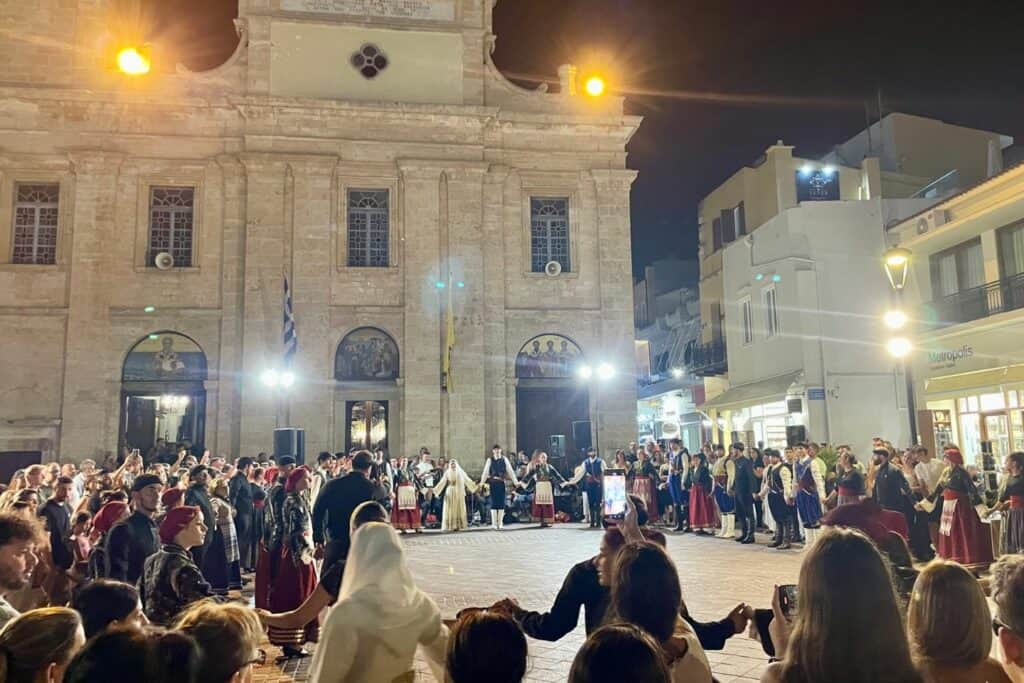
A friend and I started a fundraising group to help stray animal rescues a few years ago. We organize events from September through May that are well attended. We’ve raised over €20,000 since we started and now have several volunteers helping us.
Living in Europe, we take advantage of travel opportunities and have visited many new countries since we’ve been here. Last Christmas we drove to England to spend the holidays with my family there. We passed through 10 different countries on the trip! Fantastic experience.
This summer we did a small Greek island cruise, visiting lots of islands off the beaten track; definitely something I never thought I could have done from the States, and a big check off our bucket list!
We usually have lots of visitors in the summer, so we spend our time being “tour guides,” which is always fun.
Do you have many friends from the local population, or do you primarily socialize with other expats?
Primarily our friends are from the local expat community. We do have some Greek friends, but the majority of our socializing is done with Brits and fellow Americans.
Do you feel “accepted” in the local community?
Yes, we definitely feel accepted by the local community. We know many of the local residents in our village, and most trips to the market result in a good chat with someone I know! We are always given a warm welcome in the locals shops and tavernas.
What do you like about living overseas and specifically about Crete?
There are so many pros to living here! A much safer and more relaxed lifestyle is probably top of my list. The affordability of living here reduces any financial stressors we might have had in the US.
We live in a large villa overlooking the sea with a pool, 5 minutes from amazing beaches. It’s something we could never afford in the US.
The island is absolutely beautiful, and the weather is great for most of the year, with over 300 sunny days per year, and relatively low humidity in the summer months (after coming from Alabama, this is a godsend!).
The scenery is breathtaking: crystal clear seas, pristine beaches, and snowcapped mountains. Crete really does have it all.
As Crete is the largest Greek island, there’s always new places to explore. A couple of hours drive will get us to the south coast, which is almost like going to another country it’s so different from here. I particularly enjoy the winters, where we can walk the dogs on the beach, often without seeing another person! Bliss!
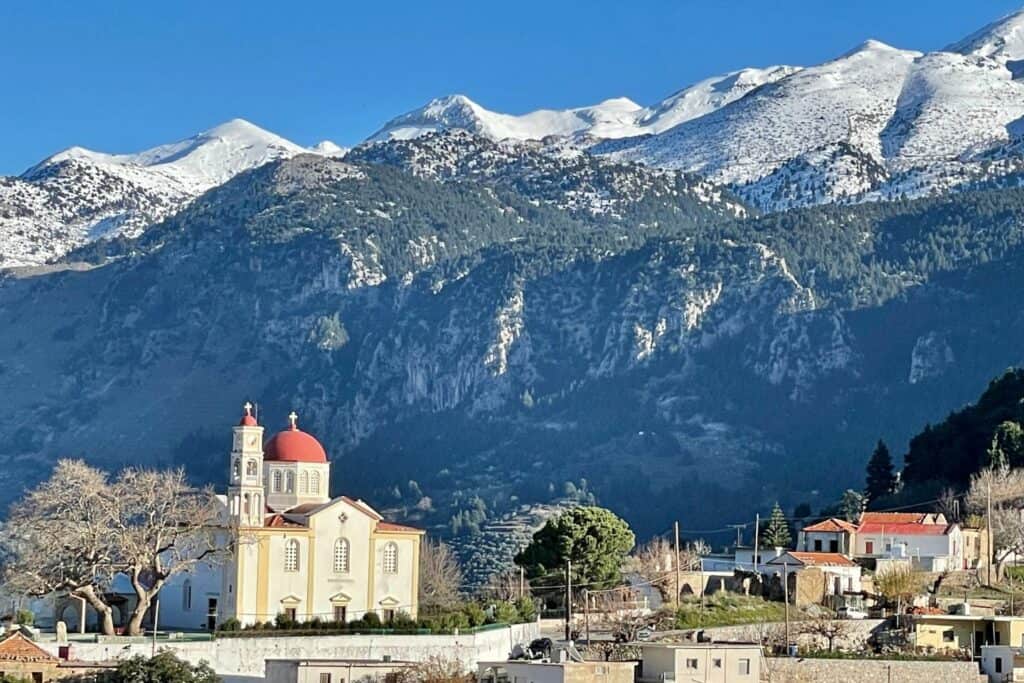
There is a large expat community here; mostly Brits and other Europeans, but with an increasing number of Americans recently. The local Greek people are welcoming, and speak excellent English (a huge benefit, as Greek is the hardest language I’ve ever encountered).
The area is safe, with very little crime, and virtually no violent crime at all, which is so important to us after seeing so much crime in our final five years in the States.
Crete is a place you can kick back, relax, and enjoy your retirement to its fullest. Also, there’s the ease of travel within Europe (a bit more complicated in the winter, as there are no direct flights and you must fly via Athens).
What are some of the challenges of living in Greece?
Honestly, the biggest hurdle to overcome is the expectation of how things are done. You must accept that this is not America, and things are not done with the same efficiency or rationale as in the States.
For example, we changed our US. driver’s licenses over to Greek ones and it took 5 months to process! This is typical here, but something you just wouldn’t expect, nor accept, in the US.
Also, the infrastructure is definitely not up to US standards. We have frequent electric and water cuts, and the trash removal situation is abysmal. Potholes are a constant road hazard, and there are still many unpaved roads once you venture away from the tourist areas.
Oh, and the hordes of tourists in the summer months can get very tedious!
There’s a serious problem with stray animals here; many Greeks do not believe in neutering their pets, and unwanted litters are just dumped at the bins. When the stray population gets too large, or becomes inconvenient, people will put out poisoned meat to cull them. My dog actually got poisoned on the beach one spring, and only immediate intervention from our vet saved her.
What advice would you give to anyone who is thinking of moving to Greece?
Just go for it!
However, there are only a few visas available for residency for Americans in Greece. The only one that allows you to work is a Digital Nomad Visa; your income must come from remote work outside of Greece and you must meet the financial thresholds.
There are two other options: the Golden Visa (which requires a minimum purchase of real estate and has recently gone up to €800k in the most desirable areas of Greece), and the Financially Independent Person Visa (again, the limits have just been raised and are now at €3500/month derived from a pension or investment income, plus 20% for a dependent).
What are your longer-term plans? Do you intend to live full-time in Crete for the foreseeable future?
Absolutely! We originally rented, and then bought our house back in 2021 and have no plans to leave.
This actually came as a surprise to both of us, as we usually get itchy feet after a few years. This is the longest we have ever stayed in one location since we were kids!
It is hard with family back in the US, but we visit every three years to catch up. Having been overseas for so many years previously has definitely made this easier to deal with.
* * *
Could YOU Move to Greece?
Theresa and Laz make Greece sound pretty amazing, so if you want to explore further, your next step is to research what residence visa could work for you.
Theresa mentioned several options above. and if you just want to experience Greece for a few years, consider a study visa. You can read interviews with fellow veterans who used study visas in Ireland, New Zealand, and Italy to learn how they made it work.
Also, before you take the leap to move to Greece or any other foreign country, we highly recommend renting an apartment and spending several weeks or months “living like a local” in the place you intend to move. Laz and Theresa were fortunate that they loved Crete as residents as much as they loved it as tourists, but that’s not always the case!
Finally, make sure you can answer these questions about your potential new home before you pull up stakes from the US!
If you’re a member of the US military community and want to join the conversation about living in a foreign country as a civilian, join our Facebook group, US Military Retirees and Veterans Living Overseas!

Thank you! Your article was most helpful, as my wife & I are about to become the next Laz & Theresa, near Chania. — USAF (Ret.)
Fantastic! Let me know if we can help! 😊
Hello. Which part of Alabama are you from? I grew up there. I am considering buying a place in Greece.
We were stationed at Fort Rucker (hubby was Army Aviation). Let me know if you have questions I can help with.
Visited Chania a couple years ago – would love to go back. Crete was fascinating – I remarked to our guide how amazing it was that a ragtag group of Brits and Cretans managed to kidnap a Nazi general right under the noses of the Nazi Army, spirit him over the high mountain range, and get him off the island during WWII – a great story outlined in Chris McDougall’s “Natural Born Heroes”. She related that her grandfather was one of that crew! Great history.
Thanks for the tip on the book! I read McDougall’s first book, “Born to Run” and it was great!
Yes! There’s definitely some interesting stories from that era. Have you read “The Cretan Runner”?
Great article, thanks Theresa! I’m retired Navy & recently bought a villa in Xirokampi, about 30 min west of Chania. I’m in my 2nd career but plan to retire for good soon. Would be great to connect with you & Laz the next time I’m on the Island as I don’t have a network there yet.